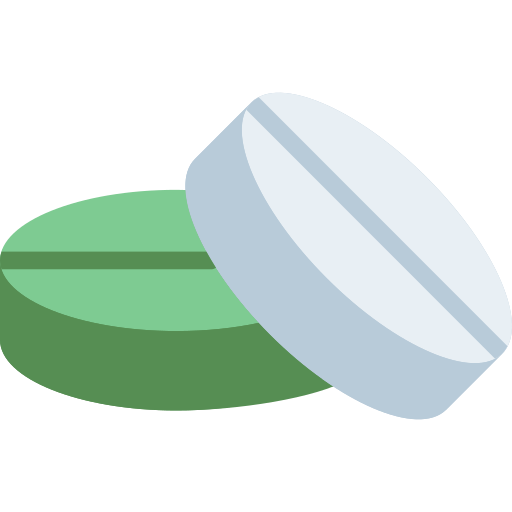
Levodopa + Carbidopa
100 mg+10 mg
Opsonin Pharma Ltd.
Product Details
Description
Levodopa, the metabolic precursor of dopamine, crosses the blood-brain barrier and is converted to dopamine in the brain. Carbidopa is a dopa decarboxylase (DDC) inhibitor which reduces the peripheral metabolism of Levodopa to dopamine, and thus, more Levodopa becomes available to the brain.
This tablet is indicated for the treatment of Parkinson's disease and syndrome. It is useful in relieving many of the symptoms of parkinsonism, particularly rigidity and bradykinesia. This tablet is frequently helpful in the management of tremor, dysphagia, sialorrhea and postural instability associated with Parkinson's disease and syndrome. Levodopa plus carbidopa before physiotherapy increases motor recovery after stroke.
Carbidopa-Levodopa tablet is contraindicated in patients with hypersensitivity to Carbidopa and Levodopa, and in patients with narrow-angle glaucoma. Since Levodopa may activate a malignant melanoma, Carbidopa-Levodopa should not be used in patients with suspicious undiagnosed skin lesions or a history of melanoma.
Adverse effects that occur frequently in patients receiving Carbidopa-Levodopa are those due to the central neuropharmacologic activity of dopamine. These reactions usually can be diminished by dosage reduction. The most common adverse effects are dyskinesias including choreiform, dystonic, and other involuntary movements and nausea. Body as a whole: syncope, chest pain, anorexia. Cardiovascular: palpitation, orthostatic effects including hypotensive episodes, hypertension, phlebitis. Gastrointestinal: vomiting, gastrointestinal bleeding, development of duodenal ulcer, diarrhoea, dark saliva. Haemotologic: leukopenia, haemolytic and non-haemolytic anaemia, thrombocytopenia, agranulocytosis. Hypersensitivity: angioedema, urticaria, pruritus, Henoch-Schonlein purpura. Nervous System: dizziness, somnolence, paresthesia, delusions, hallucinations and paranoid ideation, depression with or without development of suicidal tendencies, dementia, dream abnormalities, agitation, confusion, increased libido. Respiratory: dyspnea. Skin: alopecia, rash, dark sweat. Urogenital: dark urine.
Although the effects of CarbidopaLevodopa on human pregnancy are unknown both Levodopa and combinations of Carbidopa and Levodopa have caused visceral and skeletal malformations in rabbits. Therefore, use of CarbidopaLevodopa in women of childbearing potential requires that the anticipated benefits of the medicine be weighed against possible hazards should pregnancy occur. It is not known whether Carbidopa is excreted in human milk. Because many medicines are excreted in human milk and because of the potential for serious adverse reactions in infants, a decision should be made whether to discontinue nursing or to discontinue the use of Carbidopa-Levodopa, taking into account the importance of the medicine to the mother.
Carbidopa-Levodopa is not recommended for the treatment of medicine-induced extrapyramidal reactions. Carbidopa Levodopa may be given to patients already taking Levodopa alone; however, the Levodopa must be discontinued at least 12 hours before Carbidopa-Levodopa started. Dyskinesias may occur in patients previously treated with Levodopa alone because Carbidopa permits more Levodopa to reach the brain and, thus, more dopamine to be formed. The occurrence of dyskinesias may require dosage reduction. All patients should be observed carefully for the development of depression with concomitant suicidal tendencies. Patients with past or current psychoses should be treated with caution. Carbidopa-Levodopa should be administered cautiously to patients with severe cardiovascular or pulmonary disease, bronchial asthma, renal, hepatic or endocrine disease, or a history of peptic ulcer disease or of convulsions. Care should be exercised to patients with a history of myocardial infarction who have atriai, nodal, or ventricular arrhythmia. In such patients, cardiac function should be monitored with particular care during the period of initial dosage administration and titration. Patients with chronic wide-angle glaucoma may be treated cautiously with Carbidopa-Levodopa, provided the intraocular pressure is weli controlled and the patient monitored carefully for changes in intraocular pressure during therapy.
Use in children: Safety and effectiveness of Carbidopa-Levodopa in infants and children have not been established, and its use in patients below the age of 18 years is not recommended.
Antiparkinson drugs
Store in a cool and dry place, protected from light.
-
Support 24/7
Call us anytime -
100% Safety
Only secure payments